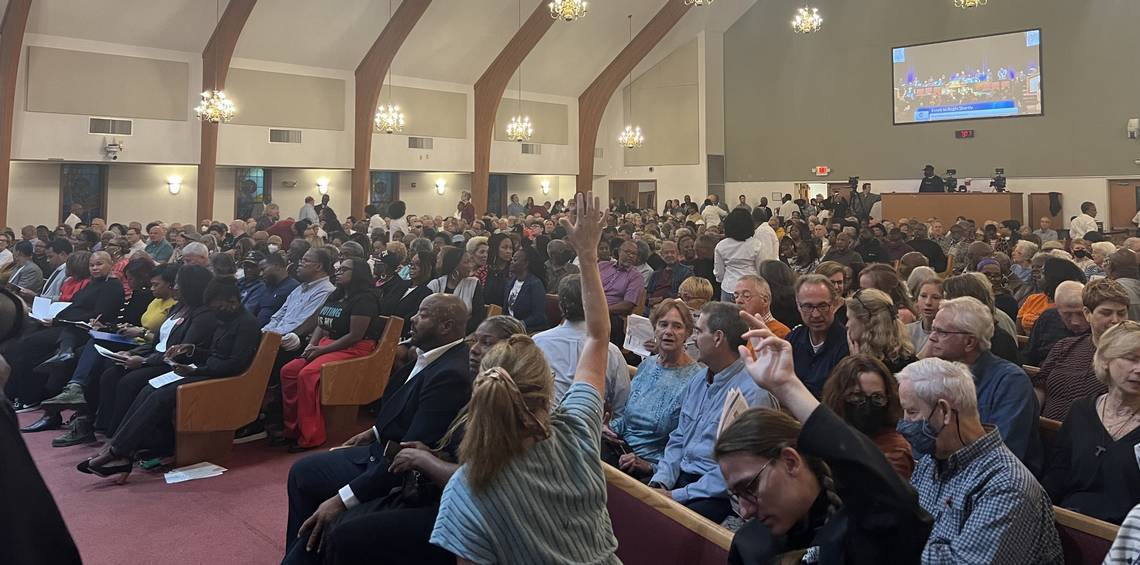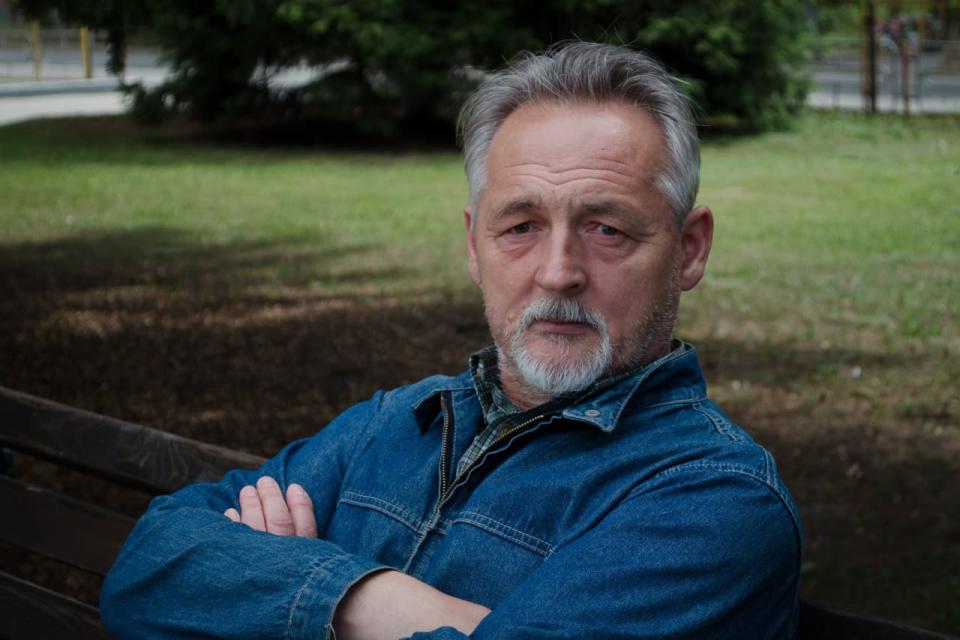
Adwoa Asante can no longer afford to live in the 625-square-foot, one-bedroom apartment she once did in Southeast Raleigh.
The daughter of Ghanaian immigrants, Asante came to Raleigh to live and work in one of the nation’s top-ranked cities for young professionals.
But even with a college degree and working multiple jobs, her income did not keep up with her rent, much less cover a down payment on a home.
“Increased rent made it impossible to stay,” Asante said at a meeting Thursday night in Raleigh. “How can I afford to buy a home when the goalpost of affordability keeps changing?”
Raleigh has over 477,000 residents and is one of the most expensive cities in the country for renters and homeowners. Wake County reported an affordable-housing deficit of 65,860 units and an increase in evictions contributing to the more than 900 residents experiencing homelessness each night.
“Discipline and paying a mortgage and bills is not the issue. That unfairly places blame on the individual and does not indict the actual systems failing to keep individuals, families, (and) communities together in stable living conditions,” Asante said.
Thursday night, the city’s housing crisis took center stage at the ONE Wake Candidate Assembly. More than 900 people packed Watts Chapel Missionary Baptist Church to hear candidates for Raleigh City Council publicly commit to prioritizing housing and closing the city’s racial wealth gap.
ONE Wake, a nonpartisan organization, and its supporters are demanding a yearly investment of $130 million in local money for affordable housing from Wake County and Raleigh and 100 acres of land to be designated for the units.
This fall, more than two dozen people are running for the eight open spots on the City Council, including the mayor’s. Nearly all of the 25 candidates in attendance Thursday expressed their general support for the proposals, but some disagreed with the funding.
An ‘unacceptable’ reality
While housing prices in the Triangle are beginning to decrease, they have not reached pre-pandemic levels. The median home price in Raleigh has dropped 6.3% since 2023 from over $400,000 to $384,000.
Rent for a one-bedroom apartment is over $1,200 a month, and $1,500 for two bedrooms, straining the average Raleigh resident, who makes about $47,000 a year. Experts generally say people are “cost-burdened” if they spend over 30% or more of their income on rent or mortgage and utilities.
The lack of affordable options prices out low and middle-income residents, many of them Black and Latino, said Donna Battle, a local minister. She said the crisis echos redlining, a practice of denying financial assistance to poor people because of where they live, and Jim Crow-era policies.
“Neighborhoods that were once undervalued have been primed for gentrification and displacement due to rising rents and property taxes. This reality is unacceptable,” Battle said. “The social fabric of neighborhoods is being destroyed by displacement.”
Bree Chaplin said her mother has been able to stay in her College Park home despite high property taxes only with the help of a homeowner financial assistance fund, through ONE Wake’s partnerships with organizations Habitat for Humanity and the NC Budget and Tax Center.
Chaplin’s great-great-grandfather was a wealthy Black man in Wilmington forcefully removed from his home and property during the 1898 race massacre.
“His property and our family’s legacy was stolen and lost,” Chaplin said. “For me, it is more than just a cause to ease my conscience. (This) is about legacy. … more importantly, it is about humanity.”
She urged the candidates to support homeownership and equity efforts, like the Nehemiah housing project backed by ONE Wake and local advocates. The project addresses displacement by keeping Black people and people of color in their neighborhoods and creating housing specifically for low-income families.
The city has made strides in addressing the housing crisis through measures like the voter-approved, $80 million Affordable Housing Bond in 2020 and increased funding for first-time homeowners in its homebuyer-assistance programs.
Last month, the Raleigh City Council approved $22.8 million to build 454 new units close to bus stops, grocery stores and doctors.
The city also has set a goal to build 5,700 affordable homes by 2026. So far, the city has built 3,439 units.
Candidates make public commitments
Thursday, each candidate was asked four yes/no questions during the assembly, and attendees had a chance at the end to ask for details.
Only 17 candidates submitted long-form answers to ONE Wake.
Candidates were asked if they would
-
Increase local affordable housing funding from $30 million a year to $70 million a year
-
Identify 100 acres of vacant and underutilized land owned by Raleigh, the county and state for affordable housing
-
Commit to supporting ONE Wake in building a Nehemiah housing development in Raleigh and traveling to a similar neighborhood in Brooklyn, New York
-
Commit to return to an assembly in one year to update the group on progress
All but four of the candidates answered each question with a resounding “yes.”
For the first question, mayoral candidate Paul Fitts, a mortgage broker, answered no, along with Kara Sanders, an unhoused community advocate who recently registered as a write-in mayoral candidate. Mitchell Silver, running for District A, said no. James Bledsoe, an at-large candidate said, “maybe.”
Because of the large number of candidates, each did not get to explain their votes beyond a yes or no.
Fitts also declined to commit to building the Nehemiah homes and making the New York trip. Sanders also said no to identifying land for affordable housing units without more information.
District C candidate Tomara DeCosta declined to give a simple yes or no answer to the questions by trying to answer them fully. The organizers did not allow her a chance to speak, so her stances were unclear at the meeting.
City Council candidates
The candidates running for the open city council are
▪ Mayor
-
Janet Cowell
-
Paul Fitts
-
Eugene Myrick
-
Terrance Ruth
-
James Shaughnessy IV
-
Kara Sanders (write-in)
▪ At-large, 2 seats
▪ District A
-
Mary Black, incumbent
-
Whitney Hill
-
Mitchell Silver
▪ District B
-
Megan Patton, incumbent
-
Jennifer McCollum
▪ District C
-
Corey Branch, incumbent
-
DaQuanta Copeland
-
Tomara DeCosta
-
Daniel Grant-King
-
Jared Ollison
-
Tolulope Omokaiye
-
Portia Rochelle
▪ District D
-
Jane Harrison, incumbent
▪ District E
Early voting runs from Oct. 17 through Nov. 2.
EMEA Tribune is not involved in this news article, it is taken from our partners and or from the News Agencies. Copyright and Credit go to the News Agencies, email news@emeatribune.com Follow our WhatsApp verified Channel





